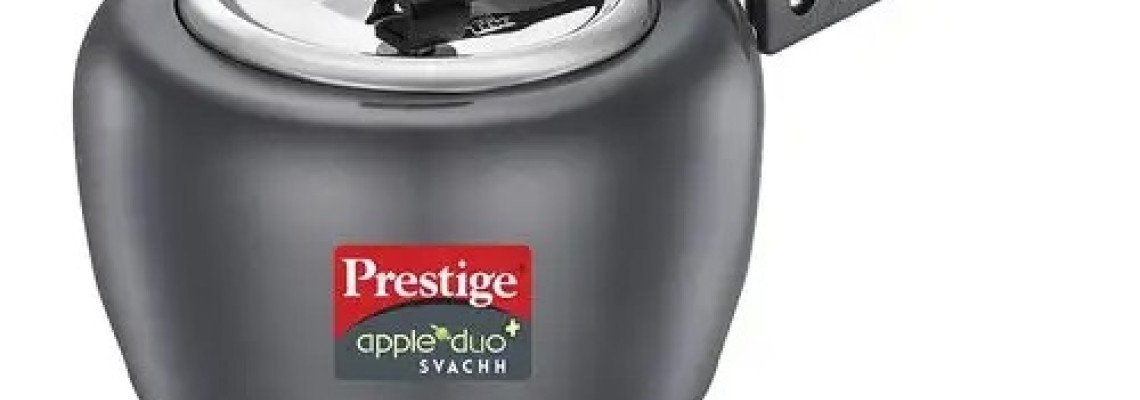
A hard anodised pressure cooker is an excellent investment for any kitchen. Its durability, scratch-resistant properties, and even heat distribution make it a top choice for home cooks and professionals alike. However, like any kitchen appliance, proper cleaning and maintenance are key to ensuring its longevity and optimal performance. In this guide, we'll walk you through practical tips on how to care for your hard anodised pressure cooker and keep it functioning like new for years to come.
Understanding Hard Anodised Pressure Cookers
Before diving into maintenance tips, it’s essential to understand what makes hard anodised pressure cookers different from other types of cookware. Unlike stainless steel or aluminium, hard anodised cookware undergoes an electrochemical process that hardens the surface. This process makes the cooker more resistant to scratches, corrosion, and damage from daily use.
This durability doesn't mean it is invincible, though. Over time, without proper care, the cooker can still wear down or develop stains. The good news? With the right cleaning and maintenance routine, you can easily extend the life of your hard anodised pressure cooker.
Regular Cleaning Routine
Daily Cleaning After Each Use
After using your hard anodised pressure cooker, it's important to clean it immediately. Allow the cooker to cool completely before attempting to clean it—this prevents the material from warping due to sudden temperature changes.
Hand Washing Is Key
Hard anodised cookware is best cleaned by hand. While some manufacturers may claim that their products are dishwasher safe, exposure to the harsh detergents and high temperatures in a dishwasher can degrade the protective surface over time.Use a mild dishwashing liquid and a soft sponge to clean the surface. Avoid using steel wool or any abrasive cleaning tools, as these can scratch the hard anodised surface.
Remove Stuck-On Food
If food sticks to the bottom of the cooker, avoid using sharp or abrasive tools to scrape it off. Instead, soak the pot in warm water with a bit of dish soap for 10-15 minutes. This will loosen the food, making it easier to wipe away.
Deep Cleaning for Stubborn Stains
Despite regular cleaning, hard anodised cookware can develop stains over time, especially if exposed to high heat or acidic foods.
Steps for Deep Cleaning:
Make a Baking Soda Paste:
Baking soda is a natural cleaning agent that's gentle on hard anodised surfaces. Mix a small amount of baking soda with water to form a paste.Apply the Paste:
Apply the baking soda paste to the stained areas and let it sit for about 10-15 minutes. This helps to lift the stains without damaging the surface.Gently Scrub with a Soft Cloth:
Use a soft cloth or sponge to scrub the stained areas. Avoid using harsh scrubbing pads that can scratch the surface.Rinse and Dry:
Rinse the pressure cooker thoroughly with warm water and dry it with a clean towel. Make sure to dry it immediately to prevent water spots or further staining.
Maintaining the Pressure Cooker Seals
The seals, or gaskets, on a pressure cooker are critical to its performance. Over time, these gaskets can wear out, lose their elasticity, or become dirty, affecting the overall cooking efficiency. Proper maintenance is essential to avoid any issues with pressure regulation.
Care for the Gaskets:
Regularly Inspect the Seals:
After every use, inspect the rubber gaskets for any signs of wear or damage. Cracked or damaged gaskets should be replaced immediately to ensure the pressure cooker functions properly.Clean the Gaskets Properly:
Clean the gaskets separately with warm soapy water, and make sure to dry them thoroughly before reattaching. If food or grease gets trapped in the gaskets, it can compromise the seal over time.Apply a Thin Layer of Oil:
Occasionally apply a thin layer of oil (like vegetable oil) to the gaskets to keep them flexible and prolong their life.
Proper Storage to Prevent Damage
Storage plays a vital role in maintaining your hard anodised pressure cooker’s longevity. Storing it incorrectly can lead to dents, scratches, or warped components.
Tips for Safe Storage:
Avoid Stacking Other Pots Inside:
When storing your pressure cooker, avoid stacking other pots or pans inside it, as this can cause scratches or damage to the surface. Use a pot protector if you must stack cookware.Keep the Lid Off:
It’s a good idea to store your pressure cooker with the lid off or upside down to allow air circulation and prevent the gasket from being compressed. Keeping the lid in place can sometimes cause an unpleasant odor due to trapped moisture.Store in a Dry Place:
Moisture is the enemy of any kitchenware, and prolonged exposure to moisture can lead to corrosion. Make sure to store your hard anodised pressure cooker in a dry cupboard or cabinet.
Avoid Abrasive Cleaners and Harsh Chemicals
Hard anodised cookware can be sensitive to harsh cleaning agents, which can wear down the surface over time. Always avoid using abrasive cleaners, chlorine-based products, or any harsh chemicals that could damage the hard anodised layer.
If you ever need a more powerful cleaner, look for products that are specifically designed for anodised cookware. These cleaners are formulated to be gentle on the surface while effectively removing stubborn stains.
Routine Checks and Replacement of Parts
Like any appliance, the different parts of your hard anodised pressure cooker, such as valves and handles, may need occasional replacement to maintain functionality. Periodically check the pressure release valve and the condition of the handles, screws, and locking mechanisms.
Replacement Tips:
Order Authentic Parts:
Always order replacement parts from the manufacturer to ensure compatibility. Generic or ill-fitting parts can compromise the safety and performance of your pressure cooker.Schedule a Yearly Check-Up:
If you use your pressure cooker regularly, it’s a good idea to do an annual check-up of all its components, ensuring everything is in working order.
Summary
By following these cleaning and maintenance tips, you can ensure that your hard anodised pressure cooker remains in excellent condition for years to come. Regular care not only preserves the appearance of the cooker but also enhances its performance, giving you reliable results every time you cook. With the right maintenance routine, your hard anodised pressure cooker will continue to be a durable and essential tool in your kitchen.
For faster and more energy-efficient cooking, an induction top pressure cooker is a smart choice for every kitchen.
Frequently Asked Questions
Can I put my hard anodised pressure cooker in the dishwasher?
No, it's best to hand wash your hard anodised pressure cooker. Dishwashers can use harsh detergents and high temperatures that can degrade the anodised coating over time.What’s the best way to remove food stuck on the bottom of my pressure cooker?
Soak the cooker in warm water and dish soap for 10-15 minutes, then gently scrub with a soft sponge. Avoid using abrasive tools.How often should I replace the gaskets in my pressure cooker?
It's a good idea to replace the gaskets every 12-18 months, depending on how frequently you use your pressure cooker.
Is it safe to use metal utensils in a hard anodised pressure cooker?
No, metal utensils can scratch the surface. It’s best to use wooden or silicone utensils to protect the anodised coating.
What should I do if my hard anodised pressure cooker develops stains?
Use a baking soda paste and gently scrub the stained area with a soft cloth or sponge. This method is gentle on the surface and effective at removing stains.





Leave a Comment